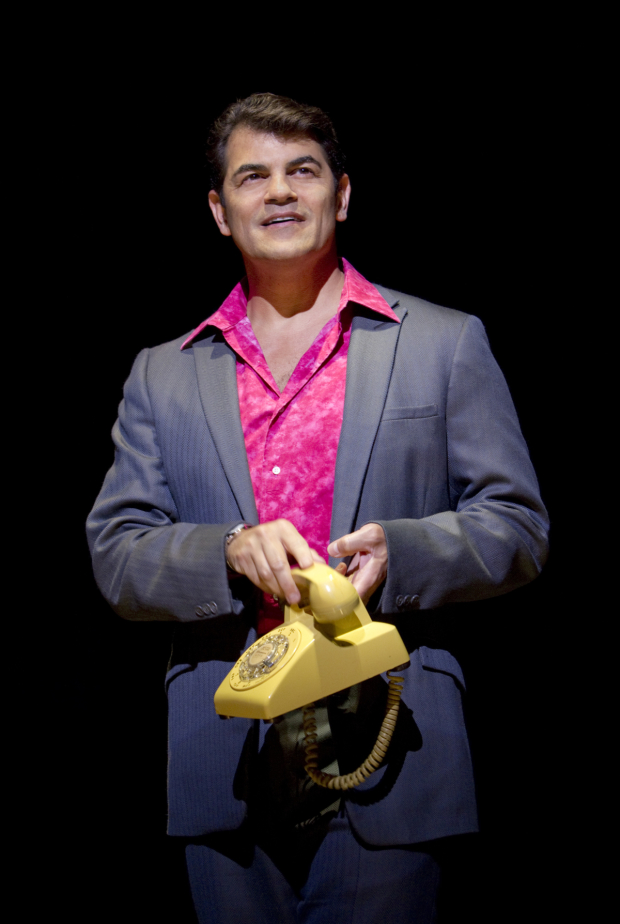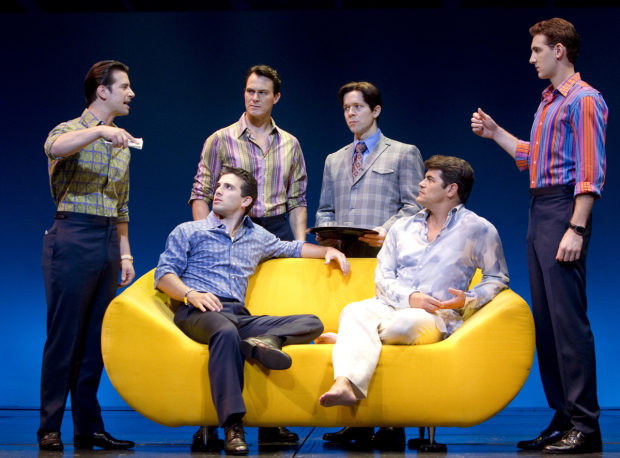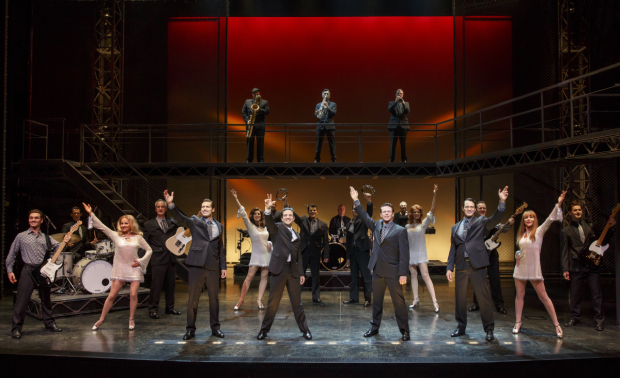Final Bow: After 11 Years, Peter Gregus Says Goodbye to Life as a Jersey Boy
Gregus originated the role of legendary songwriter Bob Crewe in the Tony-winning musical, and still plays him 4,300 performances later.
For 11 years, Peter Gregus has called Broadway's August Wilson Theatre home. In the hit musical Jersey Boys, ending its run after more than 4,600 performances on January 15, Gregus has worn several hats: Not only has he served as the show's dance and the fight captain, he also originated (and still plays) the role of Bob Crewe, the songwriter who penned Frankie Valli and The Four Seasons hits like "Oh, What a Night" and "Walk Like a Man."
A run of that length (nearly 12 years if you count the 2004 pre-Broadway run at the La Jolla Playhouse) is unheard of, and Gregus, a veteran of Contact and other shows didn't take it lightly. Appearing in Jersey Boys night after night for more than a decade has afforded Gregus with opportunities he'd never previously experienced as an actor. "It's been very rewarding," he says. "And I'm very, very grateful to have had the opportunity."

(© Joan Marcus)
1. What is your favorite line that you get to say?
It's in the car scene when I'm one of the gangsters with Frankie Valli when he's a kid. I get to say "piece of f***ing sh*t a**hole f***ing moron." It just rolls right off your tongue, and it's even better when there are kids in the front row. That's when I really lay into it. They gotta learn sometime.
2. Everyone loves inside jokes. What is the best one from your show?
On a heavy swing day, when all the swings are on, [fellow long-running original cast member] Mark Lotito and I recite this little saying: "Moe is on for Larry, Larry is on for Curly, Curly is on for Shemp, and Shemp is on for Joe Besser." Nobody knows who or what we're talking about.
3. Every show experiences technical difficulties. What was the worst technical difficulty experienced during your show and how was it handled?
The funniest and most bizarre one was the day the lighting computers freaked out, and so all lights were doing whatever they wanted. It looked like a disco onstage. After a while, it got to be like "follow the bouncing lights." You edged yourself into one when it wasn't where it should be. And then they switched colors. It was hilarious.
4. What was the most "interesting" present someone gave you at the stage door?
I got a mug quoting to me, my line "play the f***ing song already." Other guys have gotten cashmere scarves and Coach bags. I got that mug, and I use it every day. But it's the only gift I've gotten in eleven years.
5. Who is the coolest person that came to see your show? (You can't say your family!)
James Gandolfini. He came back to see it over and over again, and every time he came, he would bring four or five or six army vets or marine vets who had just gotten back from the Middle East. He was genuinely concerned with the health and welfare of our war vets. It was so touching.
6. What is the hardest thing about keeping your performance fresh for twelve years?
The most difficult thing is to not try and get the laugh; to remember to say the lines, to do the play, to tell the story. When I hear my lines sounding like singsong, I know I'm not listening. It's so easy to know that that inflection or that raise of the eyebrow will get the laugh. And sometimes being the laugh whore that I am, I just do that. But it is a very hard battle.

(© Joan Marcus)
7. When was the first time that you as a performer had an indication that Jersey Boys would have the longevity it has had?
At the La Jolla Playhouse [in 2004]. The stagehands at La Jolla had seen a lot come in and out of that theater, and they were saying that the audience doesn't normally react like this. They were going berserk. We were getting people from Scotland and Australia, different parts of the world, who were Four Seasons fans, who had heard about the show and decided to come see it. That was an indication that there was a layer of audience that was going to bolster ticket sales for this show, and it rang true.
Another layer making it palatable for an audience is that it's a guy's story. It's a story that a wife doesn't have to drag her husband to see. Not to put down any other shows, but Wicked, Mamma Mia!, these are very female-oriented stories, but this is one of the rare shows that's about men's relationships. We'd see a lot of older guys tearing up during some of the scenes because they were probably remembering stuff they had gone through with their buds. It was hitting part of the theater audience that is not as catered to.
8. Did you ever encounter the real Bob Crewe, and if so, what was the best piece of advice he provided?
I went out to L.A. and hung out with him [between the La Jolla and Broadway runs]. I had no idea what a record producer was and I wanted to absorb a little bit of his life and style. He had a crazy life that deserves its own musical. The thing that Des [McAnuff], our director, was very adamant about was being true to the script more than the real people. I wasn't pushing him too far to try and get a hold of him; the writers had done that work for me.
But I did talk to Bob Gaudio, because I wanted their perspective for him, and he said that [Crewe] was always the smartest guy in the room. That became my mantra for him. When you look at his body of work, he was the smartest guy in the room. He not only produced the music, he wrote the lyrics, he arranged the music, he sang backup. He did it all.
9. Which Frankie Valli and the Four Seasons song do you hope to never hear again?
I would say I'm not a fan of "Big Man in Town." That's on the top of the list. The sad part is there's some really beautiful stuff that we didn't get to use. "Silence Is Golden" is one song that's not in the show and I know Bob Gaudio is upset that it didn't fit. It's a beautiful song.
10. What has doing Jersey Boys for twelve years afforded you?
As a person, it's afforded me a beautiful apartment in Dumbo and a lot of fun vacations. And a chance to end a long, long time of insecurity in this business. As any actor experiences, and I don't care how successful they are, there are times when you're just not working. I never counted on it going this long. After all this time, I can throw some money in the bank, buy an apartment, live my life with my husband and my two dogs, see my family, and do things that you don't let yourself do when you're not working, like buy everybody tickets to the circus for Christmas. It's been very rewarding and I'm very, very grateful to have the opportunity to do this.

(© Joan Marcus)










